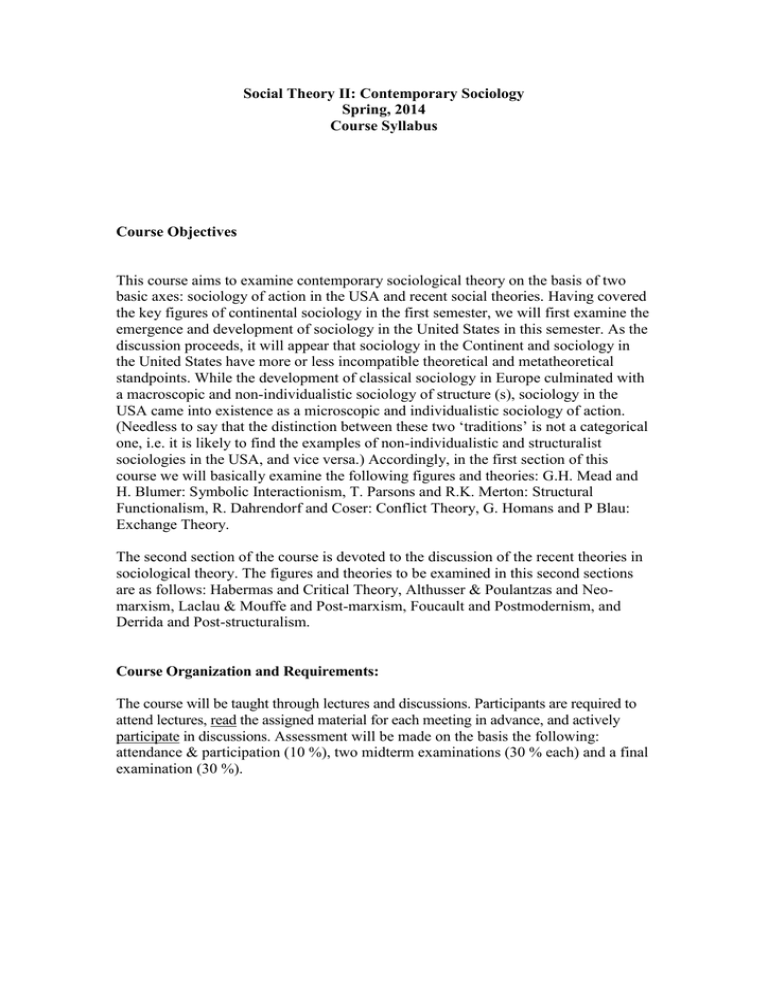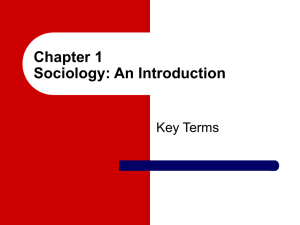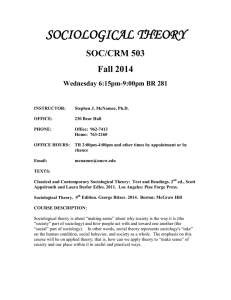SOC 232 Social Theory II
advertisement

Social Theory II: Contemporary Sociology Spring, 2014 Course Syllabus Course Objectives This course aims to examine contemporary sociological theory on the basis of two basic axes: sociology of action in the USA and recent social theories. Having covered the key figures of continental sociology in the first semester, we will first examine the emergence and development of sociology in the United States in this semester. As the discussion proceeds, it will appear that sociology in the Continent and sociology in the United States have more or less incompatible theoretical and metatheoretical standpoints. While the development of classical sociology in Europe culminated with a macroscopic and non-individualistic sociology of structure (s), sociology in the USA came into existence as a microscopic and individualistic sociology of action. (Needless to say that the distinction between these two ‘traditions’ is not a categorical one, i.e. it is likely to find the examples of non-individualistic and structuralist sociologies in the USA, and vice versa.) Accordingly, in the first section of this course we will basically examine the following figures and theories: G.H. Mead and H. Blumer: Symbolic Interactionism, T. Parsons and R.K. Merton: Structural Functionalism, R. Dahrendorf and Coser: Conflict Theory, G. Homans and P Blau: Exchange Theory. The second section of the course is devoted to the discussion of the recent theories in sociological theory. The figures and theories to be examined in this second sections are as follows: Habermas and Critical Theory, Althusser & Poulantzas and Neomarxism, Laclau & Mouffe and Post-marxism, Foucault and Postmodernism, and Derrida and Post-structuralism. Course Organization and Requirements: The course will be taught through lectures and discussions. Participants are required to attend lectures, read the assigned material for each meeting in advance, and actively participate in discussions. Assessment will be made on the basis the following: attendance & participation (10 %), two midterm examinations (30 % each) and a final examination (30 %). Course Schedule w. 1 Introduction w.2-3 Modern Society and/or the Tragedy of Culture Simmel (and Social Forms) George Ritzer Sociological Theory, (New York: Mc Graw Hill, 2011), pp. 158-187. w.4 the Emergence of Sociology in the USA and the Chicago School George Ritzer Sociological Theory, (New York: Mc Graw Hill, 2011), pp. 190-204. w.5 Symbolic Interactionism George Ritzer Sociological Theory, (New York: Mc Graw Hill, 2011), pp. 351-390. w.6 Structural Functionalism George Ritzer Sociological Theory, (New York: Mc Graw Hill, 2011), pp. 237-264 w.7 Conflict Theory George Ritzer Sociological Theory, (New York: Mc Graw Hill, 2011), pp. 265-276 w.8 Exchange Theory George Ritzer Sociological Theory, (New York: Mc Graw Hill, 2011), pp. 416-453 w. 9-10 Neo-marxism & Postmarxism George Ritzer Sociological Theory, (New York: Mc Graw Hill, 2011), pp. 277-330. Richard Kearney Modern Movements in European Philosophy (Manchester: MUP, 1994), pp. 169-189, 299-318. w. 11-12 Structuralism & Poststructuralism Anthony Giddens & Jonathan Turner Social Theory Today, (Cambridge: Polity Press, 1987), pp. 195-223. Richard Kearney Modern Movements in European Philosophy (Manchester: MUP, 1994), pp. 252-267, 113-133. w. 13-14. Postmodernism George Ritzer Sociological Theory, (New York: Mc Graw Hill, 2011), pp. 628-644. Richard Kearney Modern Movements in European Philosophy (Manchester: MUP, 1994), pp. 283-298.






